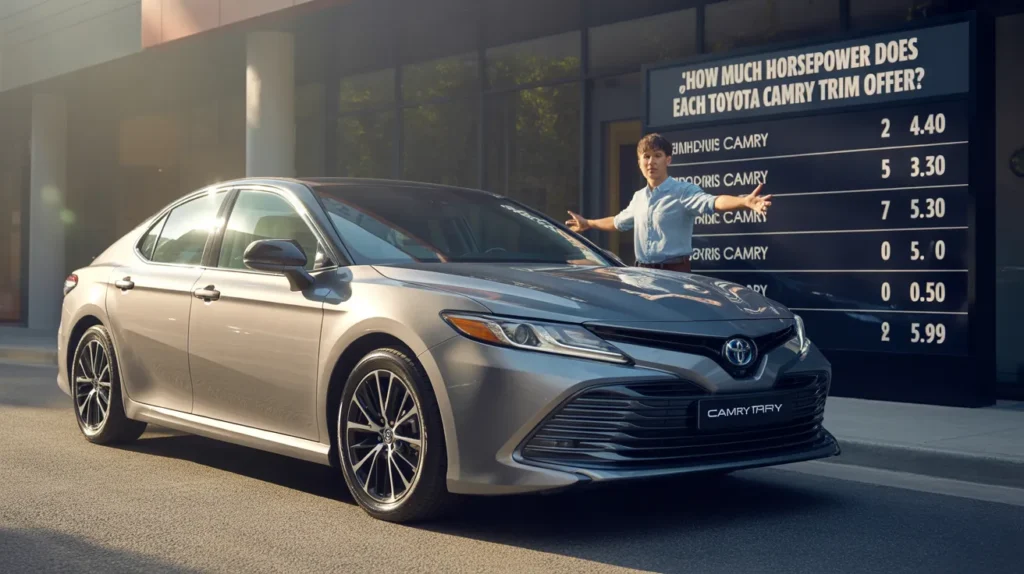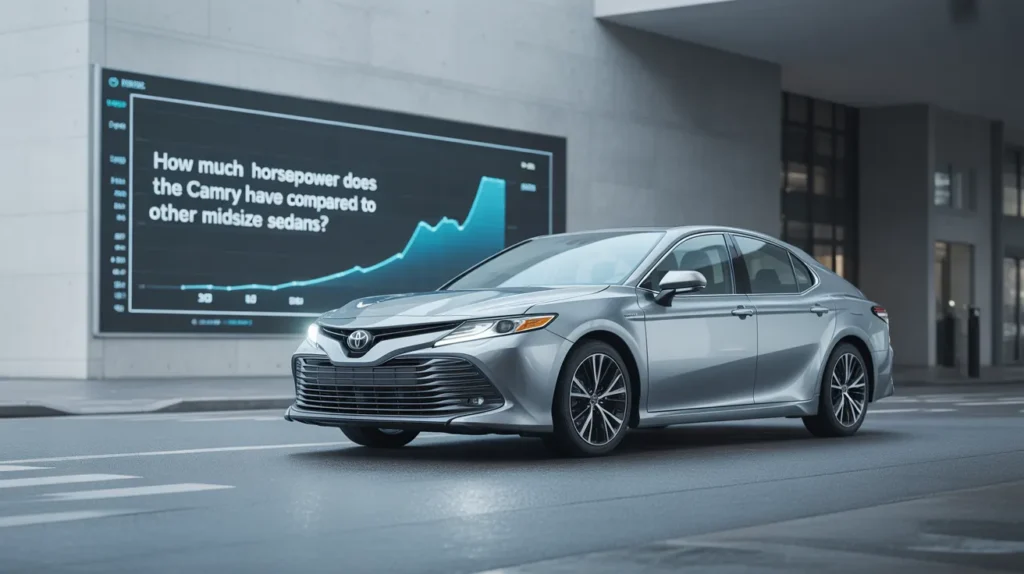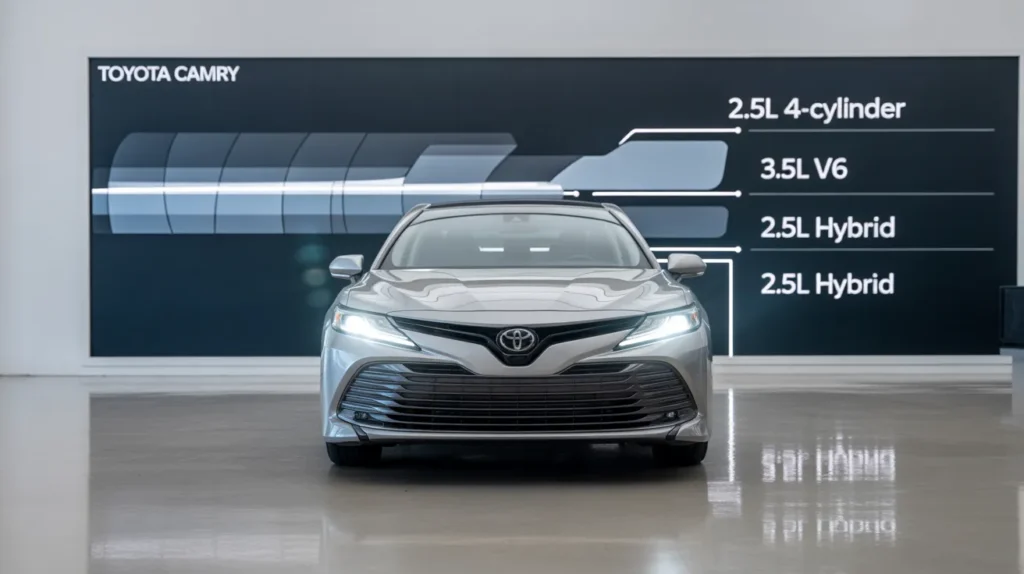A Toyota Camry comes with 203 to 301 horsepower, depending on the model and engine. The 2.5L engine is smooth and fuel-efficient for everyday use. The powerful V6 engine offers faster acceleration and extra strength, making it ideal for highway driving and overtaking other vehicles with ease.
Here, you will find horsepower details for each Camry model so you can easily choose according to your driving needs.
What Is the Horsepower of a Toyota Camry?
The Toyota Camry’s horsepower varies depending on the engine and trim level. Recent models generally produce 203 to 301 horsepower, offering options for both fuel efficiency and strong performance.
Horsepower by Engine Type:
- 2.5L 4-Cylinder: 203–206 HP
- 3.5L V6: 301 HP
- Hybrid 2.5L + Electric Motor: 208 HP (combined)
| Engine Type | Horsepower | Best For |
| 2.5L I4 | 203–206 HP | Smooth daily driving, good mileage |
| 3.5L V6 | 301 HP | Fast acceleration, highway overtaking |
| Hybrid 2.5L + EV | 208 HP | Fuel efficiency with decent power |
Whether you want fuel savings or stronger performance, the Camry offers horsepower options to match your driving style.
Also Read: Toyota Camry Hybrid Battery Replacement Cost – Best guide!
How Much Horsepower Does Each Toyota Camry Trim Offer?

The horsepower of a Toyota Camry changes with its trim and engine choice. In the 2025 model lineup, you can pick from a standard 2.5L 4-cylinder, a powerful 3.5L V6, or a hybrid option.
2025 Toyota Camry Horsepower by Trim:
| Trim Level | Engine Type | Horsepower | Torque (lb-ft) | Best For |
| LE / SE | 2.5L 4-Cylinder | 203 HP | 184 | Every day driving, fuel economy |
| XSE (I4) | 2.5L 4-Cylinder | 206 HP | 186 | Slightly more responsive daily driving |
| XLE / XSE | 3.5L V6 | 301 HP | 267 | High-speed driving, strong acceleration |
| Hybrid LE | 2.5L + Electric | 208 HP | — | Best fuel efficiency with decent power |
From efficient 4-cylinder models to high-performance V6 versions, each Camry trim offers horsepower suited to different driving needs.
Also Read: Can the Toyota Camry Hybrid Qualify for a Tax Credit in 2025
What Is the Horsepower Difference Between Hybrid and Gas Camry Models?
The horsepower of a Toyota Camry changes with its trim and engine choice. In the 2025 model lineup, you can pick from a standard 2.5L 4-cylinder, a powerful 3.5L V6, or a hybrid option.
2025 Toyota Camry Horsepower by Trim:
| Trim Level | Engine Type | Horsepower | Torque (lb-ft) | Best For |
| LE / SE | 2.5L 4-Cylinder | 203 HP | 184 | Everyday driving, fuel economy |
| XSE (I4) | 2.5L 4-Cylinder | 206 HP | 186 | Slightly more responsive daily driving |
| XLE / XSE | 3.5L V6 | 301 HP | 267 | High-speed driving, strong acceleration |
| Hybrid LE | 2.5L + Electric | 208 HP | — | Best fuel efficiency with decent power |
From efficient 4-cylinder models to high-performance V6 versions, each Camry trim offers horsepower suited to different driving needs.
Also Read: Does 2006 Toyota Camry has anti-theft device – Stay Safe!
How Does Horsepower Affect the Toyota Camry’s Speed and Acceleration?
Horsepower is a key factor in how the Toyota Camry performs on the road. It determines how quickly the car can accelerate, how easily it reaches higher speeds, and how confidently it handles overtaking. In simple terms, more horsepower means the engine can produce more power, giving the Camry better speed and acceleration in various driving conditions.
Key Effects of Higher Horsepower in the Camry:
- Faster 0–60 mph times, allowing for a stronger and smoother take-off from a stop
- Better highway passing power, making overtaking safer and quicker
- More responsive acceleration for merging into traffic or navigating city streets
- Easier hill climbing without putting too much strain on the engine
- Improved performance when carrying heavier loads or passengers
While higher horsepower improves speed and driving confidence, it’s best to choose a balance between performance and fuel economy depending on your driving style and daily needs.
Also Read: How many miles can a Toyota Camry last – Find Out in 2025!
How Much Horsepower Does the Camry Have Compared to Other Midsize Sedans?

The Toyota Camry is known for offering strong performance in the midsize sedan segment, especially with its available V6 engine. While the base 4-cylinder offers competitive power, the V6 puts the Camry ahead of many rivals in terms of acceleration and highway performance.
2025 Midsize Sedan Horsepower Comparison:
| Sedan Model | Engine Type | Horsepower | Torque (lb-ft) | Notable Strength |
| Toyota Camry | 3.5L V6 | 301 HP | 267 | One of the most powerful in its class |
| Honda Accord | 2.0L Turbo | 252 HP | 273 | Strong torque for quick response |
| Hyundai Sonata | 2.5L Turbo | 290 HP | 311 | High torque for fast acceleration |
| Nissan Altima | 2.0L Turbo | 248 HP | 273 | Smooth turbocharged performance |
| Kia K5 | 2.5L Turbo | 290 HP | 311 | Sporty and responsive drive |
The Camry’s V6 engine keeps it among the leaders in midsize sedan performance, while its 4-cylinder still offers a good mix of power and fuel economy for everyday use.
Also Read: Do Toyota Camry Hold Their Value – Check Resale Value 2025!
What Is the Ideal Horsepower for City and Highway Driving in a Camry?
The ideal horsepower for a Toyota Camry depends on where and how you drive most often. For city driving, smooth acceleration and good fuel economy matter more than raw power. On highways, extra horsepower helps with faster merging, overtaking, and maintaining higher speeds comfortably.
Recommended Horsepower for Different Driving Needs:
- City Driving: Around 200–220 HP — enough for quick starts, stop-and-go traffic, and fuel efficiency
- Highway Driving: 250+ HP — better passing power, stronger acceleration, and stable cruising at higher speeds
- Balanced Use: 200–250 HP — a good middle ground for both city and highway travel
Choosing the right horsepower means finding a balance between performance, fuel efficiency, and your personal driving style.
How Can You Increase the Horsepower of a Toyota Camry?
If you want more power from your Toyota Camry, there are several upgrades and tuning options available. Some are simple and affordable, while others require more investment and technical work. Always check your vehicle’s warranty and local regulations before making modifications.
Ways to Boost Camry Horsepower:
- ECU Remapping/Tuning: Adjusts the engine’s computer settings for more power and torque
- Cold Air Intake System: Brings cooler, denser air into the engine for better combustion
- Performance Exhaust System: Improves airflow and reduces back pressure, increasing engine efficiency
- High-Flow Air Filter: Allows more air to reach the engine for slight performance gains
- Premium Fuel (if supported): Helps the engine perform at its best with cleaner combustion
- Turbo or Supercharger Kit: Significant horsepower boost, but costly and complex to install
Upgrades can make your Camry feel quicker and more responsive, but for most drivers, a balance between power, reliability, and fuel economy is the best choice.
What Are the Horsepower Ratings for Different Toyota Camry Engines?

The Toyota Camry offers different engine options, and each comes with its own horsepower rating. Below are the common figures for recent models:
| Engine Type | Approx. Horsepower | Notes |
| 2.5L 4-Cylinder (Gas) | 203–206 hp | Standard on most trims |
| 3.5L V6 (Gas) | 301 hp | Strong performance, available on higher trims |
| 2.5L Hybrid | 208 hp (combined) | Balanced power and fuel economy |
These numbers can vary slightly depending on the model year and market.
Does Higher Horsepower in the Camry Reduce Fuel Efficiency?
Yes, generally, higher horsepower means the engine uses more fuel, especially under hard acceleration. However, Toyota’s modern engines are designed to keep efficiency reasonable even with more power.
- V6 models deliver faster acceleration but have lower MPG than 4-cylinder trims
- Hybrid models offer a good balance between adequate horsepower and excellent fuel economy
- Driving style affects MPG as much as engine size smooth driving can offset fuel loss from higher horsepower
How Has Toyota Camry Horsepower Changed Over the Years?
Over the decades, Camry’s horsepower has steadily increased, improving performance while keeping comfort and efficiency.
- 1990s models: Around 125–194 hp, focusing on economy and reliability
- 2000s models: 157–268 hp, with V6 options becoming more powerful
- 2010s models: 178–301 hp, introducing sportier trims and better acceleration
- 2020s models: 203–301 hp, with advanced hybrids and refined engine tuning
This gradual increase shows Toyota’s effort to keep the Camry competitive in performance without losing its reputation for efficiency and reliability.
FAQ’s
1. Which Toyota Camry engine gives the highest horsepower?
The 3.5L V6 engine in the Toyota Camry produces the highest horsepower, reaching up to 301 hp, giving strong acceleration and smooth highway performance.
2. Is the Toyota Camry powerful enough for long-distance highway driving?
Yes, even the base Camry engines offer enough horsepower for comfortable long-distance travel, with smooth cruising, stable speed, and reliable passing power.
3. How does the Toyota Camry’s horsepower affect towing capacity?
While horsepower helps with acceleration, the Camry’s towing capacity is more limited due to its sedan design. Most models can tow around 1,000–1,500 pounds.
4. Does regular maintenance improve Camry’s horsepower over time?
Yes, timely oil changes, clean air filters, and proper fuel system care help keep your Camry’s engine performing at its best horsepower level.
5. What is the average horsepower for older Toyota Camry models?
Older Camry models, especially from the early 2000s, typically have between 150 and 190 horsepower, depending on the engine size and trim.
Conclusion
The Toyota Camry offers a wide range of horsepower options, from efficient hybrid models to powerful V6 trims, making it a great fit for different driving needs. Whether you prioritize fuel economy, smooth city driving, or strong highway performance, there’s a Camry engine to match your lifestyle. By understanding horsepower differences across models and years, you can choose the perfect balance of power, efficiency, and comfort for your daily drives.

